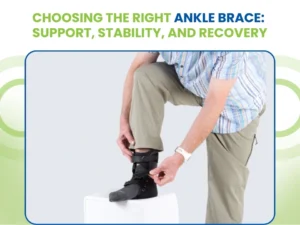Orthopedic conditions can affect individuals of all ages, causing discomfort, limiting mobility, and impacting the overall quality of life. Fortunately, orthopedic supports and devices can provide relief and assistance. For Medicare beneficiaries, understanding how to choose the right orthopedic support is crucial in ensuring comfort, mobility, and effective management of orthopedic issues. This comprehensive guide will explore the key factors Medicare beneficiaries should consider when selecting orthopedic support, coverage eligibility, and the benefits of these devices.
Eligibility for Medicare Coverage
Medicare, the federal health insurance program primarily designed for seniors 65 and older, also extends coverage to specific individuals with disabilities. Regarding orthopedic support, Medicare Part B typically encompasses durable medical equipment (DME), which includes various orthopedic devices. To qualify for Medicare coverage of orthopedic support, beneficiaries must meet specific eligibility criteria:
- Medicare Beneficiary: To access coverage for durable medical equipment such as orthopedic support, you must be enrolled in Medicare Part B.
- Medical Necessity: Your healthcare provider is crucial to the eligibility process. They must prescribe the orthopedic support while specifying its medical necessity based on your unique condition.
Factors to Consider When Choosing Orthopedic Support
Selecting the right orthopedic support involves careful consideration of several essential factors. Here are key elements to keep in mind when making your decision:
1. Type of Orthopedic Condition
The first step is to identify the specific orthopedic condition you are dealing with. Whether it’s arthritis, joint pain, back problems, or other issues, the type of condition will dictate the type of orthopedic support you need. Consult your healthcare provider for a precise diagnosis.
2. Type of Orthopedic Support
Orthopedic supports come in various forms, including braces, splints, and compression garments. Each type serves a unique purpose. For example, knee braces provide stability and pain relief, while compression sleeves help with swelling. Ensure that the type of support aligns with your condition and treatment goals.
3. Fit and Comfort
Comfort is paramount when choosing orthopedic support. Ill-fitting devices can cause discomfort and may not provide the intended benefits. Look for orthopedic supports that are adjustable or available in various sizes to ensure a proper fit. Comfortable support is more likely to be worn consistently, leading to better results.
4. Doctor’s Recommendation
Always consult with your healthcare provider or orthopedic specialist before selecting orthopedic support. They can provide valuable insights into the type of support needed, the appropriate fit, and whether it is medically necessary for your condition.
5. Medicare Coverage
Medicare may provide coverage for specific orthopedic supports, but eligibility criteria apply. Understanding Medicare’s role in covering these devices and the necessary documentation is essential to maximize your benefits.
6. Lifestyle and Activity Level
Consider your lifestyle and activity level when choosing orthopedic support. Some supports are designed for everyday wear, while others may be better suited for specific activities or recovery periods. Ensure that the support you select aligns with your daily life and goals for mobility and comfort.
7. Durability and Maintenance
Assess the durability of the orthopedic support and its maintenance requirements. Durable devices that are easy to clean and maintain can offer long-lasting benefits and cost-effectiveness.
8. Cost and Affordability
Orthopedic supports can vary widely in price. It’s essential to consider your budget and any potential out-of-pocket costs, especially if you have Medicare coverage. Some orthopedic supports may be more cost-effective while still meeting your needs.
9. Material and Breathability
Pay attention to the materials used in the orthopedic support. Breathable and moisture-wicking fabrics can enhance comfort and prevent skin irritation. The choice of material can also affect the support’s overall durability.
10. Aesthetics and Discretion
Depending on your preferences, you may want orthopedic support that is discreet and easy to conceal under clothing. Others may prioritize supports with a stylish design or color options that align with their tastes.
By carefully evaluating these factors and seeking guidance from your healthcare provider, you can decide when to choose orthopedic support that best suits your needs and improves your quality of life.
Benefits of Orthopedic Supports
Orthopedic supports offer several benefits for individuals with musculoskeletal issues or orthopedic conditions. Here are some advantages:
1. Pain Relief
Orthopedic supports can provide targeted pain relief by stabilizing and supporting the affected area. This can reduce discomfort and improve daily functioning.
2. Improved Mobility
Many orthopedic supports enhance mobility and allow individuals to move more comfortably. Whether it’s a knee brace, ankle support, or back brace, these devices can help individuals stay active.
3. Posture Correction
Some orthopedic supports, such as posture braces, assist in maintaining proper alignment and reducing strain on specific body parts. Improved posture can lead to better overall musculoskeletal health.
4. Non-Invasive Solution
Orthopedic supports offer non-invasive alternatives to surgical interventions. They can be particularly valuable for individuals who manage their conditions without surgery.
5. Preventive Measures
In addition to managing existing conditions, orthopedic supports can serve as preventive tools. They provide added stability and protection, reducing the risk of injuries or worsening of orthopedic issues.
Read More: Maximizing Benefits: How to Make the Most of Medicare-Approved Braces and Devices
Medicare Coverage Guidelines
Understanding the specific guidelines and criteria Medicare sets for orthopedic support coverage can help beneficiaries navigate the reimbursement process effectively. Medicare’s guidelines for orthopedic support coverage are designed to ensure that beneficiaries receive the appropriate medical devices and support they need. To qualify for coverage, beneficiaries must meet specific criteria outlined by Medicare. Here are the key points to consider:
- Medical Necessity: Medicare requires that a healthcare provider deem orthopedic support devices medically necessary. This means that your doctor must determine that the device is essential for treating your specific medical condition. The medical necessity is typically established based on your diagnosis, symptoms, and treatment plan.
- Type of Device: Medicare covers various orthopedic support devices, including braces, splints, and compression garments. Your device type will depend on your orthopedic condition and treatment requirements. Your healthcare provider will prescribe the appropriate device based on your individual needs.
- Supplier Eligibility: Beneficiaries must obtain orthopedic support devices from suppliers enrolled in the Medicare program. Medicare-approved suppliers meet specific quality and compliance standards, ensuring beneficiaries receive high-quality devices that meet Medicare’s coverage criteria.
- Documentation: Proper documentation is essential when seeking Medicare coverage for orthopedic support. Your healthcare provider must provide detailed documentation that includes your diagnosis, the medical necessity of the device, and the specific type of device prescribed. This documentation will be used to support your claim for coverage.
- Coverage Limits: While Medicare provides coverage for many orthopedic support devices, there may be coverage limits or restrictions. For example, Medicare may limit the number of devices you can receive within a certain timeframe or require prior authorization for specific high-cost devices. It’s crucial to be aware of any coverage limitations that may apply to your situation.
- Patient Responsibility: Beneficiaries should also be aware of their financial responsibilities when seeking orthopedic support coverage through Medicare. This may include copayments, deductibles, or coinsurance amounts you are responsible for. Understanding your financial obligations can help you plan for the costs associated with orthopedic support.
- Appeals Process: In cases where Medicare denies a claim for orthopedic support coverage, beneficiaries can appeal the decision. The appeals process allows you to challenge a denial and provide additional information or documentation to support your claim. Understanding how to navigate the appeals process is essential if you believe your claim has been wrongly denied.
By familiarizing yourself with Medicare’s coverage guidelines for orthopedic support, you can work closely with your healthcare provider and supplier to ensure that you meet all the necessary criteria for coverage. This knowledge can help you access the orthopedic devices and support you need to manage your medical condition effectively while maximizing your Medicare benefits.
Tips for Maximizing Medicare Benefits: Consultation with Healthcare Providers
When making the most of your Medicare benefits for orthopedic support, consulting with your healthcare providers is crucial. Here are valuable tips to ensure you receive the proper orthopedic support and navigate the Medicare process effectively:
- Open Communication: Maintain open and honest communication with your primary care physician and specialists. Discuss your orthopedic condition, symptoms, and treatment options. Your doctors can provide valuable insights and guidance regarding the medical necessity of orthopedic support.
- Get a Prescription: If your healthcare provider believes that orthopedic support is necessary for your condition, ensure that you obtain a prescription. A prescription is an essential requirement for Medicare coverage and serves as documentation of medical necessity.
- Consult an Orthopedic Specialist: Consult an orthopedic specialist for complex orthopedic conditions. These specialists have expertise in diagnosing and treating musculoskeletal issues and can offer specialized recommendations for orthopedic support.
- Ask About Coverage: During your medical appointments, inquire about the coverage of orthopedic support devices under Medicare. Your healthcare provider can provide information about the devices suitable for your condition and likely to be covered.
- Medicare-Approved Suppliers: Ask your healthcare provider for recommendations or referrals to Medicare-approved suppliers of orthopedic support. These suppliers have experience working with Medicare beneficiaries and can guide you through the process.
- Documentation: Ensure that your healthcare provider provides thorough and accurate documentation of your condition, diagnosis, and the medical necessity of orthopedic support. This documentation will be crucial when submitting a claim for Medicare coverage.
- Follow Treatment Plans: Adhere to your prescribed treatment plan, which may include using orthopedic support devices. Consistent use of these devices, as your healthcare provider recommends, can lead to better health outcomes.
- Review Medicare Benefits: Familiarize yourself with your Medicare benefits and coverage options. Understand any limitations or restrictions that may apply to orthopedic support devices, and be prepared to discuss these with your healthcare provider.
- Ask Questions: Don’t hesitate to ask about Medicare coverage, costs, and the specific orthopedic support devices suitable for your condition. Being well-informed empowers you to make informed decisions about your healthcare.
- Advocate for Yourself: If you encounter challenges or denials in the Medicare coverage process, be your advocate. Work with your healthcare provider to appeal decisions or seek clarification on coverage issues.
By actively engaging with your healthcare providers and following these tips, you can ensure that you receive the appropriate orthopedic support for your condition while maximizing your Medicare benefits. This collaborative approach between you, your doctors, and Medicare can improve orthopedic health and overall well-being.
Conclusion
Choosing the proper orthopedic support is critical for Medicare beneficiaries with musculoskeletal conditions. By considering factors such as the type of condition, type of support, fit and comfort, doctor’s recommendations, and Medicare coverage, beneficiaries can make informed choices to improve their comfort and mobility. Additionally, understanding the benefits of orthopedic supports and their potential for pain relief, improved mobility, posture correction, and prevention can lead to a better quality of life.









